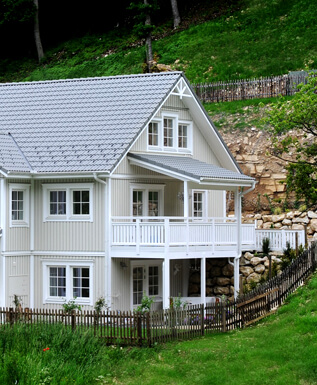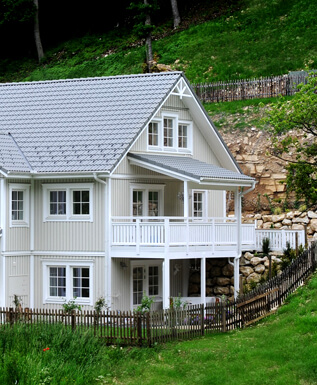
Taxation
Income from house property is taxable just as any other income like salaries, profits & gains of business and profession, income from other sources, etc., and added to total income. Tax is computed on the Annual Value of the House Property. It is calculated on the basis of inherent capacity of the house property to earn rent. "Inherent capacity" denotes the amount for which the property might be reasonably let out. This could be the actual rent received or annual ratable value fixed by the municipality, or rent of the similar property in the locality, etc.
No, when a house property is self occupied the Annual Value of such property is taken as "nil" and as such no income tax is payable. In fact you shall be eligible for deductions such as interest, etc., from you total income.
However, if you happen to be the owner of more than one house property for own residential purposes then only one house (as per your choice, it is also necessary that you reside in that house) can be treated as self-occupied and the Annual Value of that property shall be taken as nil. All other houses used for self-occupation shall be deemed to be let out and the Annual Value shall be computed accordingly and subjected to Income Tax.
Interest payable (whether paid or not on loan for purchase, repairs, renewals, construction or reconstruction of house property is allowed as a deduction (from total income) up to Rs. 30,000/-.
However, where a house property is acquired or constructed after 1st April 1999 and such acquisition is completed within 3 years from end of the financial year in which the capital was borrowed for construction or purchase of property, then the deduction allowable on interest payable shall be up to Rs. 1,50,000/- per annum.
It may be pertinent to note that the interest attributable to the period from obtaining of loan to the period prior to completion of acquisition / construction is also allowable as deduction in equal installments over five successive financial years starting from the year in which the acquisition or construction is completed. However, this benefit is not allowed for interest on loans taken for repairs, renewals or reconstruction work.
The following deductions are permissible :
- Municipal taxes actually paid as a deduction from Annual Value
- 30% of Net Annual Value, after deducting Municipal Taxes paid, towards repairs and collection charges (allowed in notional basis irrespective of the amount incurred)
- Interest on money borrowed for the purpose of construction or acquisition of a house property without any upper limit
In case of self occupied property, since the Annual Value is taken as nil, deduction is allowed on interest on borrowed capital upto a maximum of Rs. 1,50,000/- effective Financial Year 2002-03. In case of a let out property there are no restrictions on deducting the full interest payable on loans and so there can be loss under this head also.Loss from house property can be set off against income from another property and also from any other head of income such as salaries, profit and gains of business or profession, income from other sources etc., during the same financial year. In cases where the loss cannot be set off against any other heads of income within the same year then the balance loss can be carried forward and set off in subsequent years subject to a limit of 8 years but only against income from house property.
Benefit on sale of any capital assets (Section 54F) The Income Tax Act, 1961 gives an individual or HUF (Hindu Undivided Family), who does not own a residential house, a concession to purchase a residential house as and when they sell a Long Term Capital asset (for e.g. shares, bonds, debentures, motor car, etc). When you sell a capital asset normally you are required to pay tax on the gain on the value of asset after the benefit of indexation. If however, you do not own a residential house you can reinvest the net consideration received from the sale of capital assets in a residential house property and if the amount invested is equal to or more than the net consideration, no income tax is payable on such Long Term Capital gain. However, the following needs to be noted for claiming such benefit.
- You should purchase the residential house within a period of one year before or two years after the date on which the transfer took place or construct a residential house within 3 years of such transfer
- You should not own more than one residential house property other than the new asset on the date of transfer of the original asset
- You should not purchase a residential house other than the new asset within a period of one year or construct any residential house other than the new house within a period of three years after the date of transfer of the original asset
Benefits on re-investment in house property (Section 54) Apart from this if an Individual or HUF reinvests in a residential house property i.e. invests the sale proceeds of a residential house property which has been held for more than 3 years in purchase of a new house, such reinvestment is exempt from Capital Gains U/s 54 provided the new house is purchased within one year before or two years after the transaction or has constructed a residential house within a period of three years.
The following payments are eligible for rebate from tax to the extent of 20% of a maximum of Rs. 20,000 (i.e. maximum rebate is up to Rs. 4,000 p.a.) U/s 88 of the Income Tax Act.
- Any instalment or part payment of the amount due under any self financing scheme of any development authority, housing board, etc., engaged in construction and sale of house property; or
- Any instalment or part payment of the amount due to any company or co-operative society of which the assessee is a share holder or member towards the cost of the house property allotted to him; or
- Repayment of the amount borrowed by the assessee from :
- The Central or State Government
- Any bank (including Co-operative Bank)
- The Life Insurance Corporation of India
- The National Housing Bank
- Any Housing Finance Company approved by National Housing Bank for the purpose of refinance
- Any public company or co-operative society that is engaged in the business of financing construction of houses
- The assessee's employer where such employer is a public company or a public sector company or a university established by law or a college affiliated to such university or a local authority or a co-operative society
- Any of the above for payment of stamp duty, registration fee and other expenses for the purpose of transfer of such house property to the assessee.
One house or a part of the house belonging to an Individual or a HUF is not chargeable to Wealth Tax. Gift made after 1.10.98 does not attract levy of gift tax either in the hands of donor or donee.
The owner of the property is liable to pay tax on income from house property. The term "owner" also includes deemed owner. If one house property is self-occupied by the owner for residential purpose, then there will be no income from house property. If the building or part thereof is used by the owner himself for the purpose of his own business or profession then there will be no income from house property in respect of such building, provided the profit of such business or profession is chargeable to income tax separately. Whenever a person who owns a house property in one city is transferred to another city, it has been specifically provided that the annual value of such a property would be taken to be nil, subject to the fulfillment of following conditions :
- The assessee must own only one house property, which is meant for his own residence
- He cannot occupy that house property because of his employment, business, profession, etc., away from the place
- The property is not actually let out or any benefit derived therefrom
- No other deduction will be available to the asessee
Capital gains arising on transfer of a residential house, comprising building or land appurtenant thereto, is exempt if the amount of capital gains is utilised in acquiring another residential house, either by purchase or by construction. The conditions required to be fulfilled to claim exception are :
- The capital asset being transferred is a residential house property, the income of which is chargeable under the head "Income from house property"
- The house property is a long term asset i.e. held by the owner for more than 3 years
- The house property has been transferred by the individual or HUF
- The tax payer purchases or constructs a new residential house within the specified time


Our Mission & Vision
Mission S J Splendor Nest presents 20 luxurious villaments set on 4000 sft plot, each villa boasts large landscaped layout along with individual space. Each villament is spacious with 2400 sft of build up area with 3 bedrooms.
Vision S J Splendor Nest presents 20 luxurious villaments set on 4000 sft plot, each villa boasts large landscaped layout along with individual space. Each villament is spacious with 2400 sft of build up area with 3 bedrooms.

How about Some fun facts about our SJ Developers?
![]()
11 Year
![]()
1000+ Customers
![]()
15 Projects
get in Touch Feel free to get in touch with us
SJ Developers
No. 118, 8th Cross, 1st Main Road pai Layout,
K R Puram Near Tinfactory,
Bangalore - 560 016.





